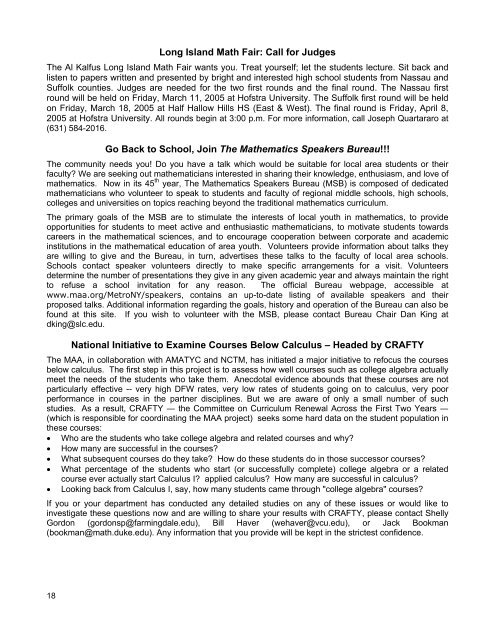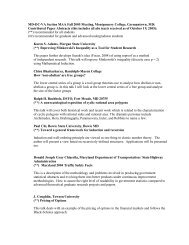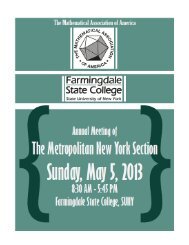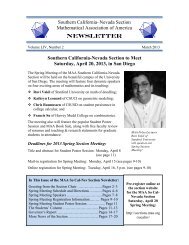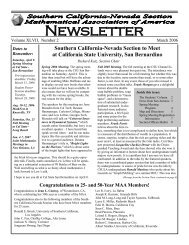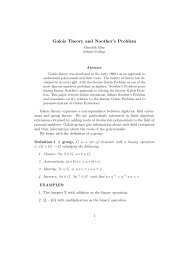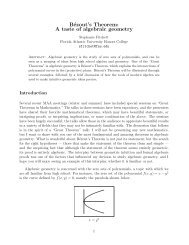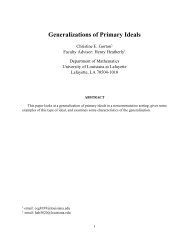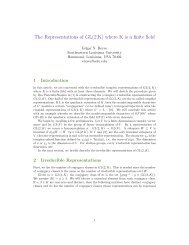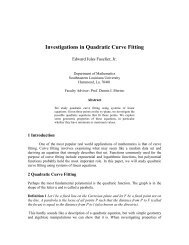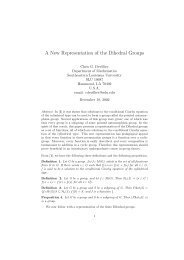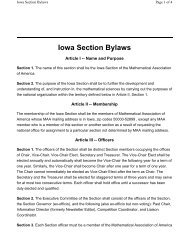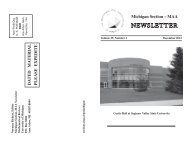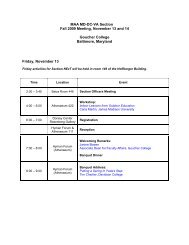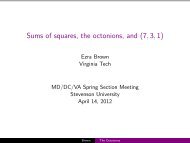2005 Newsletter - MAA Sections - Mathematical Association of ...
2005 Newsletter - MAA Sections - Mathematical Association of ...
2005 Newsletter - MAA Sections - Mathematical Association of ...
You also want an ePaper? Increase the reach of your titles
YUMPU automatically turns print PDFs into web optimized ePapers that Google loves.
Long Island Math Fair: Call for Judges<br />
The Al Kalfus Long Island Math Fair wants you. Treat yourself; let the students lecture. Sit back and<br />
listen to papers written and presented by bright and interested high school students from Nassau and<br />
Suffolk counties. Judges are needed for the two first rounds and the final round. The Nassau first<br />
round will be held on Friday, March 11, <strong>2005</strong> at H<strong>of</strong>stra University. The Suffolk first round will be held<br />
on Friday, March 18, <strong>2005</strong> at Half Hallow Hills HS (East & West). The final round is Friday, April 8,<br />
<strong>2005</strong> at H<strong>of</strong>stra University. All rounds begin at 3:00 p.m. For more information, call Joseph Quartararo at<br />
(631) 584-2016.<br />
Go Back to School, Join The Mathematics Speakers Bureau!!!<br />
The community needs you! Do you have a talk which would be suitable for local area students or their<br />
faculty We are seeking out mathematicians interested in sharing their knowledge, enthusiasm, and love <strong>of</strong><br />
mathematics. Now in its 45 th year, The Mathematics Speakers Bureau (MSB) is composed <strong>of</strong> dedicated<br />
mathematicians who volunteer to speak to students and faculty <strong>of</strong> regional middle schools, high schools,<br />
colleges and universities on topics reaching beyond the traditional mathematics curriculum.<br />
The primary goals <strong>of</strong> the MSB are to stimulate the interests <strong>of</strong> local youth in mathematics, to provide<br />
opportunities for students to meet active and enthusiastic mathematicians, to motivate students towards<br />
careers in the mathematical sciences, and to encourage cooperation between corporate and academic<br />
institutions in the mathematical education <strong>of</strong> area youth. Volunteers provide information about talks they<br />
are willing to give and the Bureau, in turn, advertises these talks to the faculty <strong>of</strong> local area schools.<br />
Schools contact speaker volunteers directly to make specific arrangements for a visit. Volunteers<br />
determine the number <strong>of</strong> presentations they give in any given academic year and always maintain the right<br />
to refuse a school invitation for any reason. The <strong>of</strong>ficial Bureau webpage, accessible at<br />
www.maa.org/MetroNY/speakers, contains an up-to-date listing <strong>of</strong> available speakers and their<br />
proposed talks. Additional information regarding the goals, history and operation <strong>of</strong> the Bureau can also be<br />
found at this site. If you wish to volunteer with the MSB, please contact Bureau Chair Dan King at<br />
dking@slc.edu.<br />
National Initiative to Examine Courses Below Calculus – Headed by CRAFTY<br />
The <strong>MAA</strong>, in collaboration with AMATYC and NCTM, has initiated a major initiative to refocus the courses<br />
below calculus. The first step in this project is to assess how well courses such as college algebra actually<br />
meet the needs <strong>of</strong> the students who take them. Anecdotal evidence abounds that these courses are not<br />
particularly effective -- very high DFW rates, very low rates <strong>of</strong> students going on to calculus, very poor<br />
performance in courses in the partner disciplines. But we are aware <strong>of</strong> only a small number <strong>of</strong> such<br />
studies. As a result, CRAFTY ― the Committee on Curriculum Renewal Across the First Two Years ―<br />
(which is responsible for coordinating the <strong>MAA</strong> project) seeks some hard data on the student population in<br />
these courses:<br />
• Who are the students who take college algebra and related courses and why<br />
• How many are successful in the courses<br />
• What subsequent courses do they take How do these students do in those successor courses<br />
• What percentage <strong>of</strong> the students who start (or successfully complete) college algebra or a related<br />
course ever actually start Calculus I applied calculus How many are successful in calculus<br />
• Looking back from Calculus I, say, how many students came through "college algebra" courses<br />
If you or your department has conducted any detailed studies on any <strong>of</strong> these issues or would like to<br />
investigate these questions now and are willing to share your results with CRAFTY, please contact Shelly<br />
Gordon (gordonsp@farmingdale.edu), Bill Haver (wehaver@vcu.edu), or Jack Bookman<br />
(bookman@math.duke.edu). Any information that you provide will be kept in the strictest confidence.<br />
18


